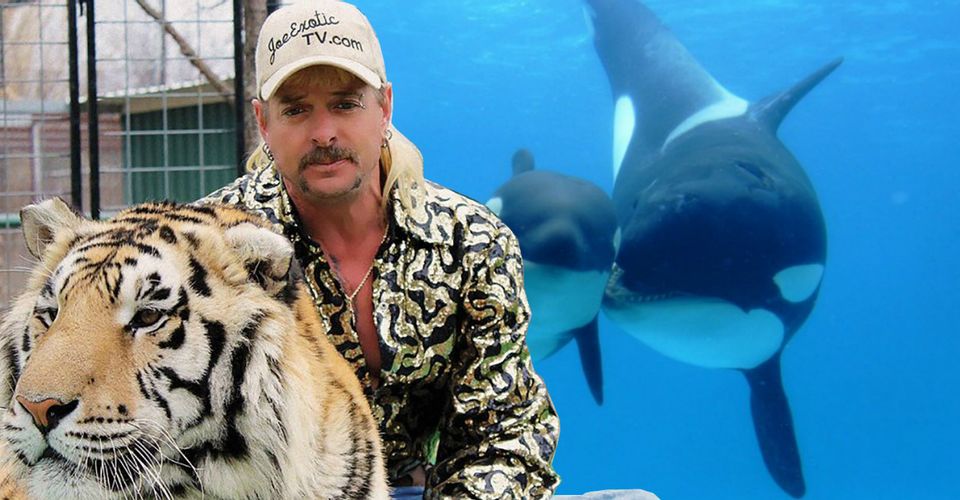Tiger King vs. Blackfish: Why The Netflix Documentary Is Harmful

Tiger King was a wildly popular Netflix show that only succeeded because it didn’t force the audience to contend with discomfort; favoring sensationalism and entertainment over engaging with complex issues like other documentaries such as Blackfish. It was an immediate success after its release in March 2020, and was watched by over 34.3 million people in the first 10 days. While the series was promoted as a Blackfish-style exposé of abuse and neglect in the big cat trade, Tiger King made its content into a spectacle and glorified the people it was supposed to be investigating.
Tiger King follows Joe Exotic, a private zoo owner in Oklahoma, and his crusade against his perceived nemesis Carole Baskin: an advocate against big cat captivity, and owner of Big Cat Rescue in Florida. The docuseries also features the colorful cast of characters surrounding Joe Exotic, including Doc Antle, a private zoo owner accused of leading a personality cult; Mario Tabraue, a former drug lord turned animal trafficker; Jeff Lowe, a Las Vegas playboy-figure who takes ownership of Joe Exotic’s zoo; and James Garretson, a confidential informant who provides the bulk of the federal case against Joe Exotic.
While Tiger King was meant to expose the exotic animal trade in the US, it instead focuses on the salacious drama between big cat traffickers. Compared to Blackfish, which famously publicized SeaWorld’s treatment of their orcas in captivity, Tiger King does nothing to raise awareness about tiger breeding practices, preferring to spend its time exploring provocative and unsubstantiated accusations. In fact, Tiger King actively undermines the cast against big cat captivity by taking down Carole Baskin, focusing less on her activism and more on unfounded rumors about the death of her ex-husband.
What The Blackfish Documentary Was About

Blackfish was released in 2013 to widespread critical acclaim for its exposure of how SeaWorld treated their orcas in captivity. Unlike most animal-rights media, Blackfish was designed as a psychological thriller following a serial killer: Tilikum, SeaWorld’s star orca whale. The film focused on the highly-publicized death of trainer Dawn Brancheau in 2010, and Tilikum’s involvement in the death of two other people. Blackfish director Gabriela Cowperthwaite revealed SeaWorld’s process of capturing wild orca whales and confining them in aquariums, causing them to develop more aggressive behaviors in captivity.
For the first time, Blackfish publicized the negative effects of captivity on marine animals, including increased aggression and stress, and featured multiple interviews with Tilikum’s trainers and witnesses of his attacks. The film refuted SeaWorld’s claims that captive whales were just as healthy as wild ones, and experienced the same quality of life – instead arguing that any captivity, no matter how impressive, was a form of abuse. Blackfish also highlighted SeaWorld’s talent for spinning criticism of their treatment of marine animals, and their longtime denial of animal abuse and cruelty.
How Blackfish Changed The World

Prior to the release of Blackfish, SeaWorld’s captive orca program was criticized mainly by animal-rights activists. In response to the film, and the subsequent backlash against Blackfish, the US congress passed a bill allocating over $1 million USD to researching the impact of captivity on marine animals, which had never been studied on a significant scale. Following the increasingly negatively publicity, and widespread boycotts of the parks, SeaWorld reported a $15.9 million loss following Blackfish‘s release. The public statement from SeaWorld blamed the attendance drop on high ticket prices and bad weather.
The release of Blackfish triggered a major public backlash to SeaWorld and their live orca shows. For the first time, the public reaction wasn’t limited to just PETA and animal rights activists, but the general public. SeaWorld immediately attempted to repair their public image by releasing a series of promotional videos defending the shows, and refuted the allegations made in the documentary as “false and misleading.” In many ways, the attempted PR battle only reinforced the arguments in Blackfish about SeaWorld manipulating the press, and ultimately turned public opinion further against them.
After a two year battle following the release of Blackfish, SeaWorld announced in 2015 that they would be phasing out the current orca shows in all parks, and debuting new shows emphasizing their behavior in the wild. SeaWorld San Diego premiered “Orca Encounter” in 2017, followed by Orlando and San Antonio in January 2020. Although the shows still feature captive orca whales, they no longer have trainers in the water, and focus more on education and conservation than music and showmanship. Blackfish alone was not responsible for the changes at SeaWorld, but it brought significant public attention and resources to studying marine life in captivity.
Why Tiger King Is Harmful, Not Helpful

While Blackfish is a scathing indictment of animal neglect and abuse, Tiger King falls short of its goals and turns big cat captivity into a spectacle. Tiger King trades facts for entertainment, and derails every attempt to say something meaningful with increasingly unsubstantiated rumors. Instead of exploring the animal trafficking and abuse allegations, it obsessively details Joe Exotic’s wild pursuits, following tangents about his attempt to run for governor of Oklahoma, his polygamous and homosexual marriages, his allegations that Carole Baskin killed her husband, and his music videos. Tiger King spends more time on the outrageous personalities of the zoo owners than genuine raising awareness about tiger breeding practices in the US.
Tiger King actively undermines its own message by taking down Carole Baskin: the series devotes over half an episode to the conspiracy theory that she killed her husband, and regularly suggests that her rescue center is just as harmful and abusive as Exotic’s private zoo. Baskin has since released a statement criticizing her portrayal in the docuseries, saying that the directors originally pitched the show to her as “the big cat version of Blackfish“. Carole Baskin publicly condemned Tiger King for not only failing to expose the exploitation of exotic cats, but creating it to be as salacious as possible to draw viewers.
Tiger King: What Happened To Joe Exotic’s Tigers
Tiger King does make an attempt to bring the show back on track, ending the final episode with a brief text card about the number of tigers in captivity in the US. However, this only reiterates a point already made in episode 1, and doesn’t retroactively refocus the series. There was another chance to course-correct when a Tiger King reunion episode was released, but with Carole Baskin’s refusal to participate, they continued to only promote the entertainment value. Tiger King reframes Baskin’s animal activism as a petty, personal vendetta against Joe Exotic, and chooses to suggest that Exotic’s private zoo and Baskin’s accredited rescue center are one and the same. By focusing so much on the outrageous drama and larger-than-life characters, Tiger King is engineered to get viewers at the expense of its message.
Netflix’s Tiger King is the latest example of true crime prioritizing sensationalism and drama over accuracy. Tiger King didn’t have to be like this: other media about Joe Exotic, including an investigative podcast from Wondery and long-form reporting from Texas Monthly have examined their subject with a significantly more critical eye, focusing on the animal cruelty and abuse allegations over the explosive details of his personal life. In another world, Tiger King could have been the Blackfish of the big cat world that Carole Baskin was promised. In this one, Tiger King is just a TV series about how Carole Baskin might’ve killed her husband.
About The Author

















